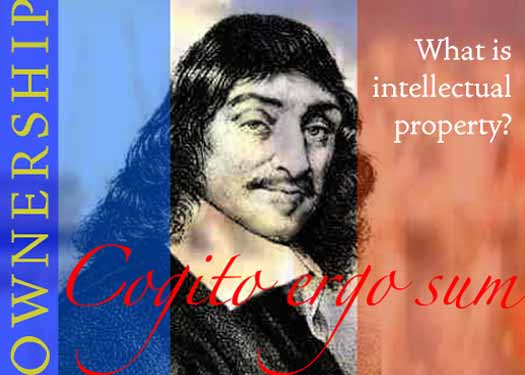
Blame it on the French, or How did we get here?
Every value a society holds is rooted in its cultural past, and the notion of plagiarism-the theft of another’s intellectual property-is no different. We can trace a line of descent back at least as far as the 16th Century French philosopher Rene Descartes. Probably you are familiar with Descartes’ most famous pronouncement: Cogito ergo sum, “I think, therefore I am.” Descartes really only intended to solve a problem that had arisen in European philosophy: How can an individual really know that he (or she) exists? How can we be sure? Descartes’ reasoning was that as long as an individual is capable of independent thought-especially of forming a self-concept-then that individual cannot be a mere puppet of some superior being; that individual exists.
So how do we get from cogito ergo sum to copyright law? Well, think about it. If the only proof I have that I exist is my ability to form independent thought(s), then my thoughts define who I am. Thus, Descartes’ pronouncement, which took a while to achieve widespread acceptance, marked Europe’s turn away from the rest of the world, where religious principles still tended to see people as the creatures of a power beyond human control. Suddenly-in historic time-Europeans came to view humans as self-created. As a result, today’s Western world views the products of individual thought differently from the way the rest of the world does.
It is therefore no accident that the first copyright laws developed in Europe, in the 18th Century, or that the United States Constitution contains a copyright clause:
The Congress shall have power to lay and collect taxes, duties, imposts and excises, to pay the debts and provide for the common defense and general welfare of the United States;
To promote the progress of science and useful arts, by securing for limited times to authors and inventors the exclusive right to their respective writings and discoveries;
United States Constitution, Article I, Section 8.
By 1789, when the Constitution was being drafted, the Founding Fathers recognized authors’ ‘exclusive right to their … writings’ thus was born the U.S. copyright law, which the act of plagiarism violates. By law, and perhaps more importantly by the ethics of Western culture, anyone who copies the words or ideas of an author without giving that author due credit by citing the original work is committing plagiarism.
This Western idea is currently being spread to the rest of the world via treaties, trade agreements (The World Trade Organization is just one example), and other measures. Basically, the Western economies have told the rest of the world to comply with copyright law or face being barred from Western markets. In effect, we’re telling the rest of the world to go back and take the turn first described by Descartes. And when your professor insists that you cite your sources, you are being invited to participate in a cultural tradition that is part of Western cultural heritage.